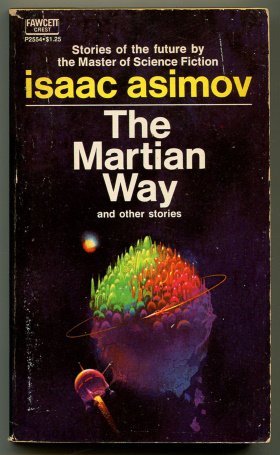Hoskins folded his arms. ‘Then shoot. I’m ready.’
‘I,’ said Marmie, ‘am more than ready.’ And he folded his arms.
Little Rollo sat there, a funy little bundle of cataleptic misery, while Dr Torgesson’s soft voice rose and fell in cadence with a spaceship battle and the subsequent struggles of Earthmen captives to recapture their lost ship.
One of the characters made his way out to the spaceship hull, and Dr Torgesson followed the flamboyant events in mild rapture. He read:
‘. . . Stalny froze in the silence of the eternal stars. His aching knee tore at his consciousness as he waited for the monsters to hear the thud and—’
Marmie yanked desperately at Dr Torgesson’s sleeve. Torgesson looked up and disconnected little Rollo.
‘That’s it,’ said Marmie. ‘You see, Professor, it’s just about here that Hoskins is getting his sticky little fingers into the works. I continue the scene outside the spaceship till Stalny wins out and the ship is back in Earth hands. Then I go into explanations. Hoskins wants me to break that outside scene, get back inside, halt the action for two thousand words, then get back out again. Ever hear such crud?’
‘Suppose we let the monk decide,’ said Hoskins.
Dr Torgesson turned little Rollo on, and a black shriveled finger reached hesitantly out to the typewriter. Hoskins and Marmie leaned forward simultaneously, their heads coming softly together just over little Rollo’s brooding body. The typewriter punched out the letter t.
‘T,’ encouraged Marmi , nodding.
‘T,’ agreed Hoskins.
The typewriter made an a, then went on at a more rapid rate: ‘take action stalnee waited in helpless hor ror forair locks toyawn and suited laroos to emerge relentlessly—’
‘Word for word,’ said Marmie in raptures.
‘He certainly has your gooey style.’
‘The readers like it.’
‘They wouldn’t if their average mental age wasn’t—’ Hoskins stopped.
‘Go on,’ said Marmie, ‘say it. Say it. Say their IQ is that of a twelve-year-old child and I’ll quote you in every fan magazine in the country.’
‘Gentlemen,’ said Torgesson, ‘gentlemen. You’ll disturb little Rollo:’ They turned to the typewriter, which was still tapping steadily: ‘ – the stars whelled in ther mightie orb its as stalnees earthbound senses insisted the rotating ship sto od still.’
The typewriter carriage whipped back to begin a new line. Marmie held his breath. Here, if anywhere, would come—
And the little finger moved out and made: *
Hoskins yelled, ‘Asterisk!’
‘Marmie muttered, ‘Asterisk.’
Torgesson said, ‘Asterisk?’
A line of nine more asterisks followed.
‘That’s all, brother,’ said Hoskins. He explained quickly to the staring Torgesson, ‘With Marmie, it’s a habit to use a line of asterisks when he wants to indicate a radical shift of scene. And a radical shift of scene is exactly what I wanted.’
The typewriter started a new paragraph: ‘within the ship—’
‘Turn it off, Professor,’ said Marmie.
Hoskins rubbed his hands. ‘When do I get the revision, Marmie?’
Marmie said coolly, ‘What revision?’
‘You said the monk’s version.’
‘I sure did. It’s what I brought you here to see. That little Rollo is a machine; a cold, brutal, logical machine.’
‘Well?’
‘And the point is that a good writer is not a machine. He doesn’t write with his mind, but with his heart. His heart.’ Marmie pounded his chest.
Hoskins groaned. ‘What are you doing to me, Marmie? If you give me that heart-and-soul-of-a-writer routine, I’ll just be forced to turn sick right here and right now. Let’s keep all this on the usual I’ll-write-anything-for-money basis.’
Marmie said, ‘Just listen to me for a minute. Little Rollo corrected Shakespeare. You pointed that out for yourself. Little Rollo wanted Shakespeare to say, ‘host of troubles,’ and he was right from his machine standpoint. A ‘sea of troubles’ under the circumstances is a mixed metaphor. But don’t you suppose Shakespeare knew that, too? Shakespeare just happened to know when to break the rules, that’s all. Little Rollo is a machine that can’t break the rules, but a good writer can, and must. ‘Sea of troubles’ is more impressive; it has roll and power. The hell with the mixed metaphor.
‘Now, when you tell me to shift the scene, you’re following mechanical rules on maintaining suspense, so of course little Rollo agrees with you. But I know that I must break the rules to maintain the profound emotional impact of the ending as I see it. Otherwise I have a mechanical product that a computer can turn out.’
Hoskins said, ‘But—’
‘Go on,’ said Marmie, ‘vote for the mechanical. Say that little Rollo is all the editor you’ll ever be.’
Hoskins said, with a quiver in his throat, ‘All right, Marmie, I’ll take the story as is. No, don’t give it to me; mail it. I’ve got to find a bar, if you don’t mind.’
He forced his hat down on his head and turned to leave. Torgesson called after him. ‘Don’t tell anyone about little Rollo, please.’

























